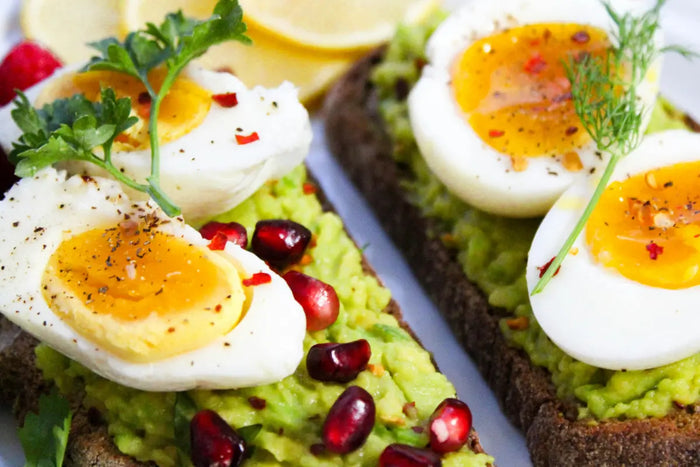Sometimes lunchtimes in the workplace can lead to some pretty heavy feelings of jealousy.
Look to your left and someone’s ordered a tasty takeout treat. Look to your right, and someone’ else is eating yesterday’s leftover pizza that looks really, really good. Open the shared office fridge, and there are piles of tupperware filled with someone’s lunch for the week.
Yeah. All five days of it.
You may be thinking, what is meal prepping? Why do people do it? And how do people meal prep? There are a huge host of benefits when it comes to meal prepping, but planning (and starting) your meal prep journey can be pretty daunting. That’s where we come in.
Why meal prep?
People meal prep for a variety of reasons, but mostly to save. Save time, save energy and save on calories (normally gained from those tempting office snacks or the café round the corner).
How to meal prep
Meal prepping is a skill. A science, if you will. Here at Innermost, we’re big fans, and love starting our weeks off with some healthy meal prep to set us up for the week.
We’ve rounded up our five top meal prepping tips to get you going and sum up the fundamentals of a healthy meal prep strategy…
Make sure you’re cooking in batches
Wondering when to meal prep? Once a week. We recommend a Sunday. In batch.
If you batch cook once a week, that means that when you get home from work (and your potentially timely commute) you don’t have to worry about dinner for the evening (and even lunch for the next day) and can put your feet up straight away. Nice. Nailed it.
Cooking in batch means that you cook up a number of portions at once (perhaps one portion for everyday of the week, or multiple people) so that you don’t have to prepare your meals everyday the night before.
Batch cooking is a great way to save time and money, as batch cooking enables you to freeze and save your meals for future use. Not only is this extremely cost effective, it’s a really sustainable way to ensure that you are making the most out of the ingredients that you are buying.
Download an app for your inspiration
If you’re falling victim to eating the same old meals every day for lunch and dinner, don’t worry, you’re not alone. Finding inspiration for your cooking and recipes can be difficult, and sometimes it can just be easier to cook that classic Spaghetti Bolognese again.
If you’re struggling, why not use an app to help you?
Unsurprisingly (as there really is an app for everything these days), there are a number of apps that allow you to tailor your meal prep to you, giving you complete control over your dietary preferences, recipes and ingredients – even with your fitness goals in mind!
Some of our favourites include…
Don’t forget to mix it up
Remember not to eat the same things day in, day out. That’s going to get real boring, real fast.
Whilst batch cooking is a real game changer when it comes to meal prepping and saving time, make sure that you aren’t batch cooking so much so that you’re only eating one thing, all of the time. A healthy meal prep plan includes a variety of meals, ingredients, and nutrients to ensure that your diet is balanced.
If you’re struggling, you can throw in a protein shake using The Health Protein every once in a while. They act a as a pretty good meal replacement, too.
A healthy meal prep strategy is a varied meal prep strategy.
Make sure you pack smart
If you’re freezing or transporting your meal prep, it’s important that you are packing and storing your meals correctly. Ensure that you are using microwavable containers for ease of use, and make sure that your containers are leak free to avoid any spillages on your way to the office.
If you’re using reusable plastic containers over glass, ensure that the plastic is BPA free, too. Once you’ve found a suitable container, buy one for each day and then you only have to wash up once a week, too! It’s a win-win situation.
Don’t forget the labels
When you’re in the meal prep mode, it can be pretty easy to forget when you’ve cooked a certain meal, what you’ve cooked, and when you need to eat the contents by.
Once you’ve portioned out your meal prep, make sure to label the container – this is especially helpful if you’re freezing foods for future use. Labelling also wards off potential break room thieves who are checking the fridge for an easy lunchtime steal when you’re not looking…
Summary
Having a healthy meal prep strategy not only will include your diet, but help you safe money, time and energy. It seems like a no brainer to us, really.
If you’re still struggling for inspiration when it comes to easy meal prep recipes, check out some of our favourites featured on Insight, below:
- The Best Cookbooks For Healthy, Simple Meals
- Our Five Favourite On-The-Go Lunches
- Vegan Mushroom and Lentil Bolognese
- Sweet Chilli Chicken and Rice
- 5 Easy And Healthy Snacks For Work
Happy meal prepping, Innermoster’s!


















